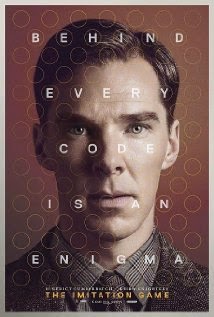The Imitation Game
The Imitation Game (2014)
Directed by Morten Tyldum
Before I begin I just have to say, I love this movie! I thought Morten Tyldum’s depiction of World War II and Alan Turing, the Cambridge mathematics genius who cracked the Nazi Enigma code during the Second World War, was riveting, heartfelt, and fascinating. This story is one of those long lost tales of courage and sacrifice that are underrepresented in today’s major motion pictures. In the past, World War II has largely been represented by battles and heroes who sacrificed their lives for their country. Horrific battle scenes and realistic depictions of death, courage under fire, and the struggle to survive have often been seen in films like Franklin J. Schaffner’s Patton (1970), Steven Spielberg’s Saving Private Ryan (1998), and David Ayer’s recent blockbuster film Fury (2014). Too often history is misunderstood as something concrete, but in reality history is much more malleable. With The Imitation Game, director Morten Tyldum supports this argument by offering audiences a novel way of looking at the past.
Tydum’s brilliance comes from not only showing audiences an alternative front line, but also his ability to link history with contemporary issues. Specifically, the film accomplishes this feat by integrating the characters personal lives into the plot. Mostly the film does this by showing the tremendous struggles and sacrifices Turing endured as a gay man in a country that outlawed homosexuality. Though this fact has little to do with his role in winning the war against Nazi Germany, the film nonetheless places a significant amount of energy telling Turing’s extremely sad last chapters of his personal life. As the film also points out Turing’s personal struggle was not an isolated incident. In fact, as the film explains, under the Law of 1533 more than 40,000 British citizens were convicted of homosexuality during the late 19th century and early 20th century. By concluding the film with these heart wrenching facts about the history of homosexuality it is hard not to think about the current events surrounding gay rights.
Secondly, the film highlights the struggles of women during the mid- 20th century. Joan Clarke, played by Keira Knightley, is a young and brilliant woman who struggles to break free of her family’s expectations of domesticity. As the film lightly points out, females typically held lower ranking jobs, such as secretary, and they never worked side-by-side with men. Even during World War II when more people were needed to replace the jobs men left behind women continued to be discriminated against. As a result Clarke worked as a secretary during the day but would secretly assist in cracking Nazi codes at night. The film, unfortunately spends little time discussing Clarke’s personal struggle and story. The inclusion of Clarke as a major character, however, points to the fact that during the Second World War German soldiers weren’t the only enemy people fought. This style of representation not only points to unread chapters in our history, but it also reminds us that our contemporary issues have deep roots, and only by looking back can we begin to move forward.
Fordhum University. “The Law of England: 1290 - 1885.” Accessed January 4, 2015. http://legacy.fordham.edu/halsall/pwh/englaw.asp
The Imitation Game. Directed by Morten Tyldum. Produced by Black Bear Pictures and Bristol Automotive. 2014.
"The Imitation Game Photos." The Weinstein Company. Accessed January 5, 2015.http://theimitationgamemovie.com/#./Photos



Comments
Post a Comment